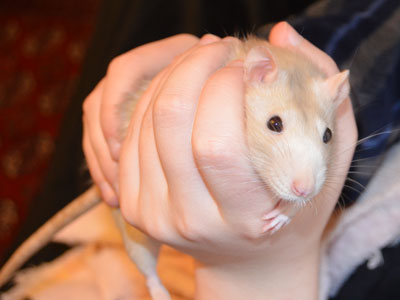
Why Rats, and How to Pick a Rat
So you’re thinking about getting a pet, and you can’t decide what kind. I assume you either already have cats and/or dogs, or have ruled them out, since pocket pets are usually a “what other kind of pet can we get” consideration.
So let’s look at rats as pets. Rats are affectionate, smart, social animals who truly bond with their owners. Additionally, being in a cage, they are much easier to care for, clean up after, and leave for a vacation than a dog would be. (Cats, I’ll grant you, are pretty self-sufficient, and pretty easy. Cats can be hard on couches and rugs though!).
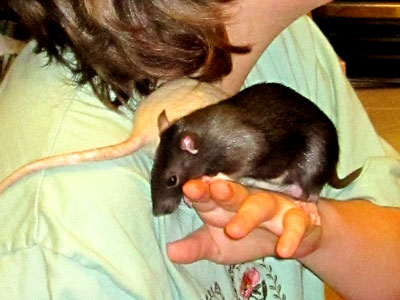
Affection
Rats are, honestly, not as affectionate as dogs, but they are as sociable as many cats, and more so than most other pocket pets. Once they know you, they’ll run to the front of the cage when you walk past, hoping for a scritch or a treat, and will run up your arm and onto your shoulder like no other pocket pets I know of will.
No other small pets I’ve had would do that, and I’ve had hamsters, guinea pigs, and a rabbit in the mammal-category. Of these, the rabbit was the most affectionate). Unlike dogs, rats have to learn to trust you (they are small prey animals after all), so give it time, and train them with treats. They need the treat to have incentive to run up to you before they know you; once they know you, the treat is just a nice bonus for them. Male rats are lazier and a lot more willing to sit on your lap and be scritched for long periods of time, while female rats are more prone to exploration.
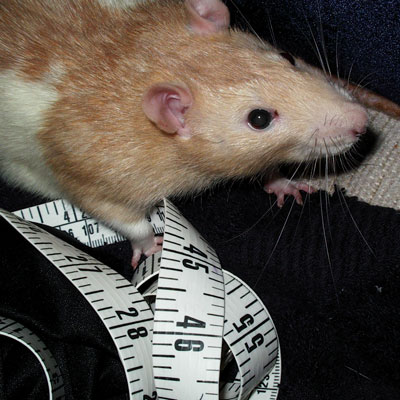
Care
Rats are easy to care for, relative to dogs, and about equal to cats. They require litter changes every day or so, and cage cleaning, depending on the size of the cage and the number of rats, from daily to weekly. Other than that, they require feeding, watering, and attention every day, just like every other pet. Except fish. I don’t know if they require attention.
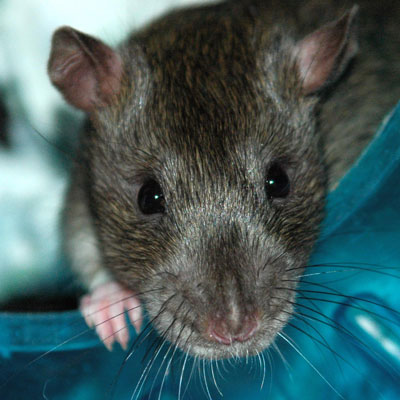
Startup Costs
As far as start-up costs go, rats are actually expensive, if you do it right. As I discuss in Housing, I advocate for spending most of your rat-preparation money on an excellent cage. The best cages have lots of room, which the ratties need, they spend most of their lives there; are easy to clean, which makes for a nicer living space for the rats; are sturdy and well-laid out, which helps you and them.
We spent about $300 total getting an excellent cage, a supply of food, a temporary cage for when our rats were tiny (we used an aquarium because they probably could have fit through the wire bars of our big cage at first), some treats, water bottles, litter bowls (which I got at a thrift store), and towels for bedding.
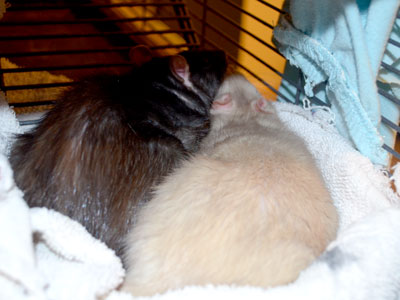
Maintenance Costs
That said, our maintenance cost now is almost non-existent; food is maybe $2/month, treats maybe $1/month, and sometimes we replace their bedding when it gets too chewed up, but that’s maybe $1/month due to thrift shops and yard sales. I make their toys, give them lots of cardboard to play with, and they’re happy.
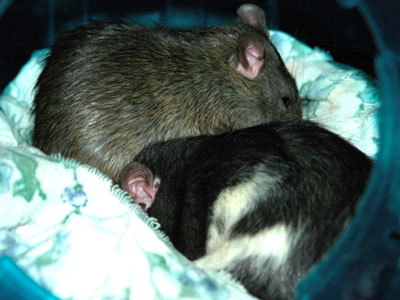
Picking Rats
Ok, so you’ve decided rats are for you. First and most important, get two, or more. Rats are very social animals, never alone in the wild, and if you get just one you will have a sad, lonely rat on your hands. Trust me, your rats will love you even if they have other rats, so please don’t think getting just one will make the rat love you more, it doesn’t work like that. Your one rat will just be lonely 20 or more hours of the day.

Male vs. Female
What to get, male or female? We’ve had both, and hands down, my preference is female. But there are other people who will just as emphatically say they prefer male.
Here are my reasons: females are softer; they smell MUCH better; they don’t fight with each other as much (we did have one male rat who we think died after a fight with another male rat, though we will never be sure what happened); they are more interesting to watch (they run around more); they seem much better about using the litter and keeping their cage clean and tidy.
For people who prefer males, they tend to say: males are more cuddly with you, their owner; males don’t make as much noise, since they don’t run around the cage as much; males are less prone to certain tumors and things that often kill female pet rats; males are bigger, and some people like that.
In the end, it’s personal preference. We loved all our rats, but from now on, having had both, we’ll just get females. But please, whatever you do, get two. And, uh, hopefully I don’t need to say this, but please get two of the same gender. Or you’ll soon have a lot more than two.
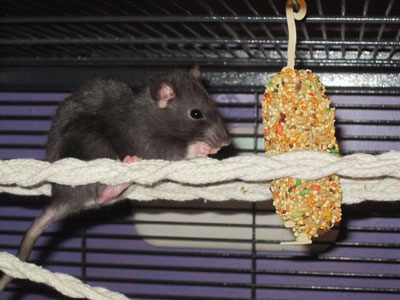
Where to get your rats
Some rat afficionados will advocate only getting pet rats from rat breeders, but from many years on rat forums, I never noticed that bred rats were any healthier overall than pet store rats. The only real difference seems to be who you’re supporting ... do you want to support someone who mostly breeds rats to feed snakes, or do you want to support someone who loves rats and breeds them as pets? Ideally the latter, of course, but that’s not always an option.
Some people get rescue rats, from people forced to get rid of their pets by parents or a college dorm, which is wonderful, but I’d advocate having some experience with your own rats before jumping into that arena.
We actually got all of our rats from PetSmart, Petco, and a skeezy little pet store that only had rats for feeder rats, because that was what was available to us. That said, our rats have overwhelmingly been healthy and good-tempered ( we did have one very crotchety male, Templeton, who was like the old man down the street who waves his cane at people, but I really just think that was who he was).
My main advice would be to get the youngest rats you can (once they’re old enough to be weaned, of course), because then you can give them lots of attention when they are still very impressionable, and they will bond to you the more. Our two current females, Squeaky and Reepacheep, were tiny when we got them, they looked like mice, and the whole rest of their litter had just been bought up as feeder rats from Petco, so I don’t think they’d been handled much or treated as pets before we got them.
But we held them, and fed them treats, and they learned to love us, and now they are very affectionate with us. When we first brought them home, actually, the very first day, my daughter was letting Reepacheep roam a bit on the couch, and that’s a bad idea when they’re still small and skittery.
(Now we could let them roam on the floor, and they’d come right back to us when we shook the treat bag; we wouldn’t, of course, but I have no fear they’d run away). In a blink of an eye, the young, scared rat ran right into the workings of the couch, a perfect hideaway. We removed cushions, and searched and searched, but she was well and fully in the couch. So there was nothing for it but to cut out the lining of the couch from below, which we did, and we eventually found her nestled up in the arm of the couch, after much frantic looking and one damaged couch.
So the moral of this story is: well, don’t be too attached to your furniture. Oh, and, until the rats know you and will run to you, keep them under especially close watch and hold when you have them out.

Rats and Other Pets
One other topic is how rats get along with other pets. Ok, well, don’t see how they get along with other small pets, like hamsters and mice, please, because I suspect I know how that would end, and it wouldn’t be good for the hamster or the mouse. Rats are predators as well as prey, and hunting is an instinct. Please don’t let them exercise that instinct.
Cats, on the other hand, can do serious damage to rats, and will given the chance, so protect your rats from any possible cat damage. When we had our first rats, our cat Elizabeth would watch them, tail switching, so we always made sure to have them loose when she was in another room.
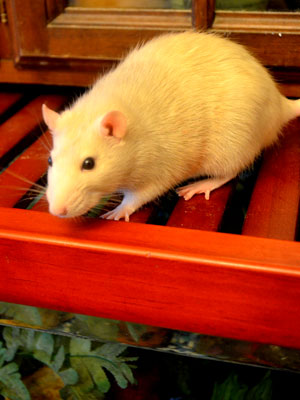
One interesting thing, though, is that our beagle, Sniffy, loved our rats. Like, loved them as a parent. I’m not sure how we found that out, I’d like to think it was a completely safe way, but honestly it may have been an accidental meeting. However it happened, we learned that he was very loving and protective toward the rats. He’d lay on the bed or the couch while they ran all around him, and over him, and snuggled into his legs to sleep. He even chased off Elizabeth a few times when she snuck too close to where the rats were playing for his taste. Um, I have to say though, I don’t endorse seeing if your dog likes your rats ... that could very quickly end very badly for the rats.
Rats are truly excellent small pets for children who are responsible and loving toward animals, and I’ve heard from many people who wanted a pet in college and had rats in the dorm, not being allowed to have cats or dogs. If you’re looking for a small pet, and are considering rats, browse the site at bit, and feel free to email me at laraklopp@aol.com if you have any further questions. I’m happy to tell you what I know.
Also, there is a small but very loyal rat-pet-owning community online, who are an excellent source of information and answers (though they can be a little judgmental about other people’s rat-owning choices, so be prepared. I shudder to think what some of them would say about my choice to have the best cage/living arrangement for my rats, but not more than the most basic of veterinary care. Use your own moral compass to decide how you can best provide a life to these sweet little creatures, and go from there!)
